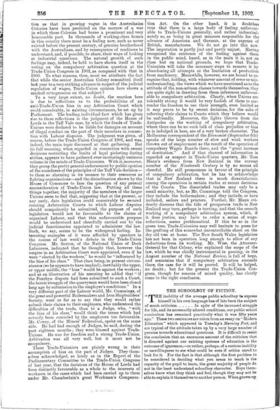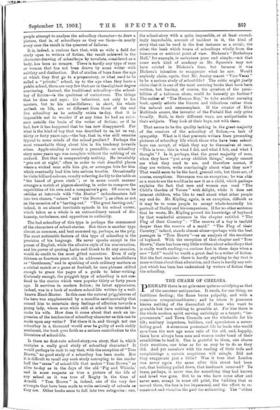THE SCHOOLBOY OF FICTION. HE inability of the average public
schoolboy to express himself in his own language has of late been the subject of much criticism In spite of the increased struggle for life, and its necessarily altered conditions, our public school curriculum has remained practically what it was fifty years ago." These two sentences are taken from an essay on" Modern Education" which appeared in Tuesday's Morning Post, and are typical of the attitude taken up by a very large number of persons towards educational questions. It is difficult to resist the conclusion that an enormous amount of the criticism that is directed against our existing systems of education is the outcome of ignorance,—or rather, perhaps, of a curious inability or unwillingness to see what could be seen if critics cared to look for it. For the fact is that although the first problem to be considered in deciding what you mean to teach is the capacity of the pupil to learn, the great majority of people do not in the least understand schoolboy character. Boys them- selves know what they think and feel, though they may not be able to explain it themselves to another person. When grown-up
people attempt to analyse the schoolboy character—to draw a picture, that is, of schoolboys as they see them—in nearly every case the result is the queerest of failures.
It is, indeed, a curious fact that, with so wide a field for study open to writers of fiction, the result achieved in the character-drawing of schoolboys by novelists, considered as a body, has been so meagre. There is hardly any type of man or woman that has not been drawn by some writer with
• subtlety and distinction. But of studies of boys from the age at which they first go to a preparatory, or what used to be called a "private," school, up to the age when they leave a public school, there are very few that are in the slightest degree convincing. Instead, the traditional schoolboy—the school- boy of fiction—is the quaintest of caricatures. The things that he does and says ; his behaviour, not only to his masters, but to his schoolfellows ; in short, his whole outleek on life, are so different from those of the real live schoolboy as he actually exists to-day, that it is impossible not to wonder if at any time he had an exi.t- ence outside the brain of the writer of fiction; or if he had, how it has happened that he has now disappeared. For what is the kind of boy that was described to us, let us say, thirty or forty years ago,—the boy, that is, who still remains typical to some minds of the school product ? Perhaps the most remarkable thing about him is his tendency towards crime. Apple-stealing is merely a peccadillo: no schoolboy story some years ago was complete without the .robbing of an orchard. But that is comparatively nothing. He invariably "gets out at night," often in order to visit dreadful places where a wicked man sells him gin, or arranges bets for him which eventually lead him into serious trouble. Occasionally he visits billiard-saloons, usually referring darkly to the table as "the board of green cloth"; or in some occult manner arranges a match at pigeon-shooting, in order to compare the capabilities of his own and a companion's gun. Of course, he collides at intervals with "the Doctor" (schoolmasters fall into twO classes, " ushers " and "the Doctor"), as often as not on the occasion of a "barring-out." "The great barring-out," indeed, is an almost inevitable episode in his school career, which taken as a whole is an extraordinary record of dis- honesty, turbulence, and opposition to authority.
The bad schoolboy of this type is perhaps the commonest of the characters of school-stories. But there is another type almost as common, and best summed up, perhaps, as the prig. The most noticeable feature of this type of schoolboy is the precision of his language. He never speaks except in the purest of English, while the allusive style of his conversation, and his power of quoting Latin and Greek to fit any occasion, would do credit to the most gifted raconteur. Even if only thirteen or fourteen years old, he addresses his schoolfellows as "Gentlemen," and in speaking of such ordinary matters as a cricket match or a game at football, he uses phrases stilted enough to grace the pages of a guide to letter-writing. Curiously enough, the priggish type of schoolboy is not con- fined to the stories which were popular thirty or forty years ago. It survives in modern fiction; its latest appearance, indeed, was in a book of modern school-life written by a well- known Head-Master. In this case the natural priggishness of the hero was supplemented by a maudlin sentimentality that caused him to entertain deep feelings of affection towards a young lady, whom even while dill at school he intended to make his wife. How does it come about that such an im- pression of the tendencies of schoolboy character as this can be made upon any writer ? Yet there it is, and though not one schoolboy in a thousand would ever be guilty of such sickly sentiment, the book goes forth as a serious contribution to the literature of school-life.
Is there no first-rate school-story,—a story, that is, which contains a really good study of schoolboy character ? It would perhaps be rash to say that, with the exception of "Tom Brown," no good study of a schoolboy has been made. But it is difficult to recall any such study conveying to the reader half the "sense" of school-life that makes "Tom Brown" as alive to-day as in the days of the old 'Pig and Whistle,' and in some respects as true a picture of the life of any school as it was true of Rugby in the time of Arnold. "Tom Brown" is, indeed, one of the very few attempts that have been made to write seriously of schools as they are. Other books seem to fall into two categories : one, the school-story with a quite impossible, or at least exceed- ingly improbable, amount of incident in it, the kind of story that can be used in the first instance as a serial ; the other, the book which treats of schoolboys wholly from the humorous or satirical point of view. Dickens's " Dotheboys Hall," for example, is caricature pure and simple,—not that some such kind of academy as Mr. Squeers's may not have existed in Dickens's time, but because it was Dickens's intention to exaggerate what be saw. Would anybody claim, again, that Mr. Anstey meant " Vice-Versi " to be a serious study of school-life ? The critic might justly claim that it is one of the most amusing books that have been written, but leaving, of course, the question of the possi- bilities of a talisman alone, could he honestly go further ? The author of "The Human Boy," to take another amusing book, openly selects the bizarre and ridiculous rather than the natural and commonplace. If the creator of Dick Bultitude sneers, the inventor of the Piebald Rat only grins broadly. Both, in their different ways, are antipathetic to their subjects. They look at their boys, not with them.
That seems to be the quality lacking in the great majority of the creators of the schoolboy of fiction,—a lack of sympathy. What is it that prevents writers from presenting pictures of schoolboy life which those who have been school- boys can accept, of which they say to themselves at once, "This is true ; this is what I did, and what I felt, and what I thought " ? Is it, perhaps, that the great majority of men, when they have "put away childish things," simply cannot see what they used to see, and therefore cannot, if they are writers, write convincingly about what they saw ? That would seem to be the hard, general rule, but there are, of course, exceptions. Stevenson was an exception; he was ablp as a man to see the world as he saw it as a child, which perhaps explains the fact that men and women can read "The Child's Garden of Verses" with delight, while it does not interest children, who like to read about what other people say and do. Mr. Kipling, again, is an exception, difficult as it may be to some people to accept whole-heartedly his portrait of Stalky and his companions. If for no other sentence that he wrote, Mr. Kipling proved his knowledge of boyhood by that wonderful sentence in the chapter entitled "The Flag of their Country " : "The reserve of a boy is tenfold deeper than the reserve of a maid." "The Flag of their Country," indeed, stands almost alone—perhaps with the beat passages in "Tom Brown"—as an analysis of the emotions of boyhood. With the exception of that chapter and "Toni Brown," there has been very little written about schoolboys that is really worth reading,—a curious fact in these days when a new "field" would be worth a great deal to a writer of fiction. But the fact remains: there is hardly anything to-day that is more written about than education, and there is hardly any sub- ject which has been less understood by writers of fiction than the schoolboy.







































 Previous page
Previous page